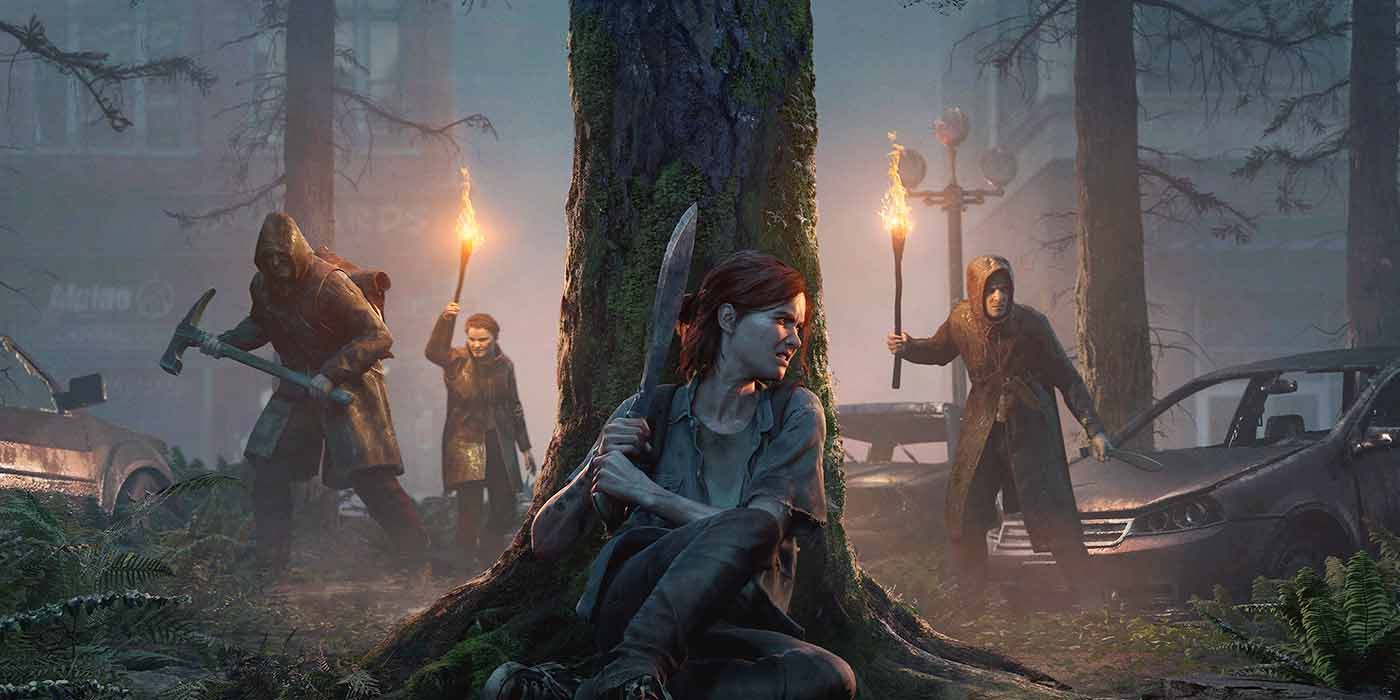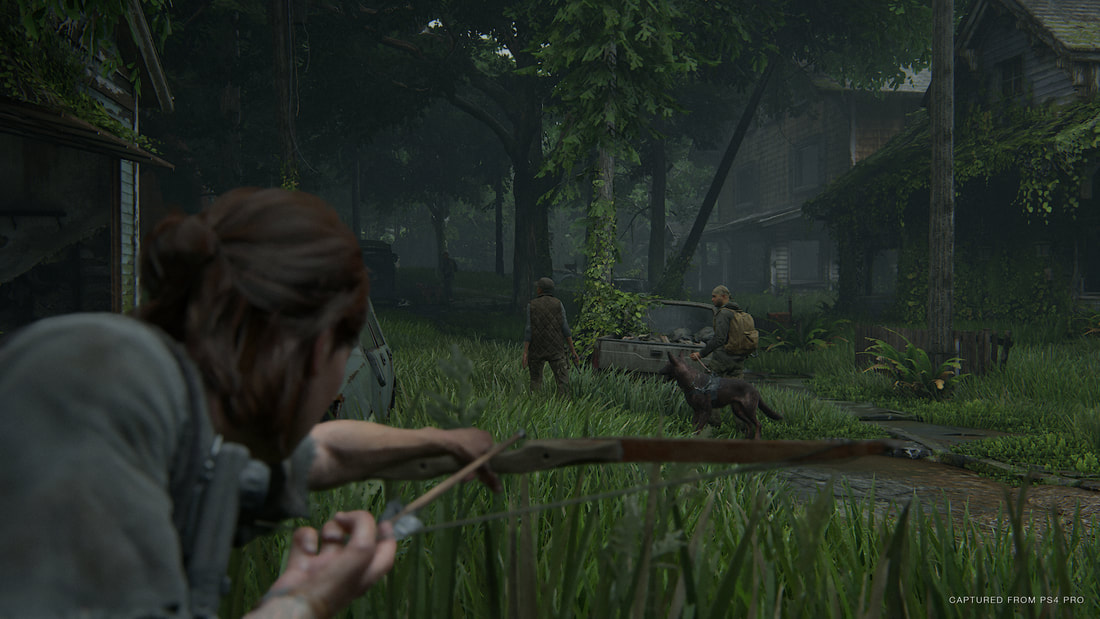|
I drop down from a ledge and find myself in another enclosed area, unenterable buildings and impassable trees lining the path to the entrance for the next enclosed area at the opposite side. Between me and this objective are a smattering of waist high walls, some ammo and resources dotted around and four enemy NPCs on alert to insert some bullets into my body. Any gamer will be intimately acquainted with this setup. Let’s get murdery. My initial plan of stealth is thwarted, as it often is, when one NPC turns a corner unexpectedly to see me choking out their comrade. Naturally, they are shocked, recoiling for a moment before shouting, “She’s here!” so the other two are made aware of my presence. This whistleblower isn’t able to contribute much more, as they are quickly introduced to the shell spewing end of my shotgun. The remaining grunts, having seen another of their friends reduced to a fine paste, close on my position. Unfortunately for the first of them, this is a double barrelled shotgun. Now empty and with the final enemy taking aim, I rush to close the distance and melee with my lead pipe. However before I can strike the finishing blow, this nondescript cannon fodder NPC drops her weapon, falls to her knees, hands protecting her face and screams, “Please don’t kill me!” This isn’t how it’s supposed to go. Enemy AI are supposed to vainly fight you to the death, even after you’ve already killed dozens of their friends because, by God, they are going to be ‘the’ one that finally gets you. Sure occasionally you’ll have someone mutter a half hearted plea in a brief, intimate moment when you’ve snuck up on them before you incapacitate/kill them, but never anything this visceral, this desperate, this real. I’ve never seen this in a game before. Of course I still killed her. It’s a game, that’s what you’re supposed to do. If I’d let her go, what, was she just going to leave the area and gratefully live out the rest of her life? No, she’d either redraw her dropped gun on me or go and alert more baddies, after all I’m on her turf. At least that’s what I tell myself, I didn’t let her go so I’ve no way of knowing. Honestly after 20 years of gaming it was sheer instinct to take the fraction of a second to press Square and effortlessly launch the lead pipe into her skull. But, for the first time, that decision has stayed with me. The Last of Us Part II is all about how you are your antagonist’s antagonist. What is right and just for you is an unforgivable crime to those you perpetrate those actions on. And, without going into the bigger story, of which this constant shifting of perspectives is a main feature, it is present in even these smallest encounters. It’s the closest you can come actually feeling like you are fighting people instead of pixels. They all have names. They’ll call out for Colins, Sarahs and Zoes, both when they find their body (you just killed something with a name) and to periodically check in. This one in particular was such a small addition but made so much sense, unlike most other games where enemies follow their pre programmed pathing, completely unconcerned that the bustling crowd of comrades they were surrounded by but moments ago have mysteriously vanished, thanks to your spree of stealth takedowns. Of course other games have this, notably the Batman Arkham series as they get more terrified as their numbers dwindle, but usually only when they stumble upon a body, here they are proactive in sticking together and working as a team to hunt you down. *minor spoiler paragraph*
Even the dogs have names. When I took out a dog from range with a bow (there are no good boys in this game while playing as Ellie) its owner upon discovery cried out, “Oh my God, they killed Bear! They killed my dog!” A few chapters later in a flashback scene, I encounter the same dog called Bear, sitting happily as I scratch his ears. Since my first encounter with Bear was from ambient dialogue, this is a connection not every player would get, but one that adds so many extra dimensions with one throwaway line. *minor spoilers over* This extra level of immersion also works to The Last of Us Part II’s detriment though, as it is only one faction that has these unexpectedly human reactions. The others, the Infected - zombies that only bum rush you with no concern for their safety or other Infected - and a religious cult who are far more stereotypical in their belligerence and AI aggression are much less interesting to fight, though there are large periods of the game where they are the only enemies, and it’s at these points where the game starts to feel like a slog. The main theme of The Last of Us Part II is the rather unsurprising stance that violence is destructive. I have no issue that it makes that point by making me commit endless acts of violence, it’s a video game, what else are you supposed to do? This is a point Naughty Dog themselves have toyed with in the past, with Uncharted 4 having a trophy called ‘Ludonarrative Dissonance’ - the disconnection between a game’s story and its gameplay - for when quippy and personable protagonist Nathan Drake kills 1000 people, but as a player you should be able to distinguish between what is important to the story and what is there to make the game fun. That was what The Last of Us did so effectively in that random scene as an unimportant character begged for her life, it blurred the lines between Ellie’s story and the genocidal killing spree she commits for the telling of that story. Most video games, even the morally complex ones, tend to nullify that choice through gameplay bonuses. Bioshock gives you more resources for sparing the Little Sisters than killing them. Spec Ops: The Line gives you much needed ammo for executing downed enemies, so there’s little reason not to trigger that brutal kill animation. In The Last of Us I gained nothing for killing that pleading woman, other than the certainty that she could not then take up arms against me again. At least, that’s what I tell myself.
0 Comments
|
Archives
June 2020
Categories |


 RSS Feed
RSS Feed
